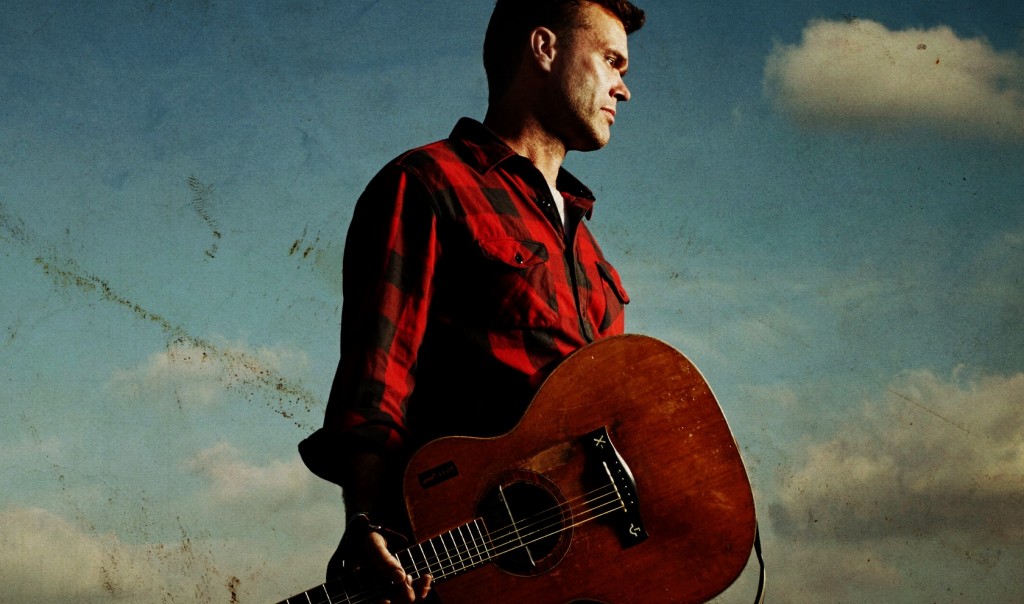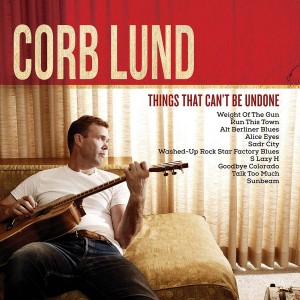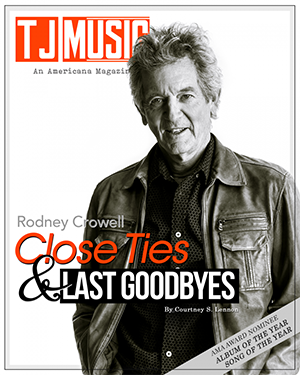
Corb Lund’s Things That Can’t Be Undone
By Brian Rock
Corb Lund continues to be one of the most interesting voices in Americana today. His latest album, Things That Can’t Be Undone, continues his streak of inspired and insightful musical milestones.
Despite being from Canada, Corb has a keen insight into the American experience. On issues like gun violence, veteran’s affairs, and family farming, Corb is able to put himself in the picture and tell the story from the point of view of those directly involved. Perhaps it’s the very fact that he is beyond American borders that allows him to see American issues so clearly. Freed from a generation of political infighting, he doesn’t feel the need to shout down the other side. He is free to ignore the macrocosm of politics and focus on the microcosm of the people who are actually affected by these issues.
 In “Weight of the Gun” for instance, Corb doesn’t shout slogans or demonize one side or the other. He tells a story from the point of view of a man serving time for his crime. Singing, “My hands are empty but my mind is filled with things that cannot be undone. How many years since I fired a pistol, but I still feel the weight of the gun,” Corb vividly shows the lifetime of regret that can follow a single, terrible moment with a firearm. On the other hand, his character’s remorse stands in stark contrast to the jihadis and sociopaths who are incapable of remorse and therefore aren’t likely to be deterred by any new laws restricting gun use. One story with two sides, but Corb finds the humanity beyond the headlines.
In “Weight of the Gun” for instance, Corb doesn’t shout slogans or demonize one side or the other. He tells a story from the point of view of a man serving time for his crime. Singing, “My hands are empty but my mind is filled with things that cannot be undone. How many years since I fired a pistol, but I still feel the weight of the gun,” Corb vividly shows the lifetime of regret that can follow a single, terrible moment with a firearm. On the other hand, his character’s remorse stands in stark contrast to the jihadis and sociopaths who are incapable of remorse and therefore aren’t likely to be deterred by any new laws restricting gun use. One story with two sides, but Corb finds the humanity beyond the headlines.
With a voice that’s part Robert Earl Keen and part Ernest T. Bass, Corb Lund sings with a “voice of the people” earnestness that suits his straightforward lyrics. So when he sings in “S Lazy H,” that “the roots of my people, they run dep in this place. I am sixth generation S Lazy H,” you believe his connection with the land. And when later he sings, “I have lived with the sorrow and will die with the shame. For now the bank owns what’s left of the S Lazy H,” you feel the heartbreak of the people he sings for.
But Corb is also capable of finding the humor in life’s rich pageant. His trademark wit is on full display in “Washed-Up Rock Star Factory Blues.” Confronting every musician’s worst nightmare, he admits that, “I’ve done a lotta singin’ about ‘Stick it to the man.’ Today’s the day he’s gonna stick it right back if he can.” With laugh-out-loud lines about backstage passes to the janitor’s closet and using artistic talent to paint the fence, Corb pokes a little fun at himself and those in his profession who’ve forgotten what it’s like to have to work a real job.
Corb’s talented band, The Hurtin’ Albertans add depth and texture to Corb’s stories with their genre-bending backbeats. From the Stax-inspired rhythms of “Weight of the Gun,” to the early British invasion feel of “Alt Berliner Blues,” and from the Bakersfield sound of “Goodbye Colorado,” to the Dylanesque “Talk Too Much,” the album delights and surprises with its sonic diversity.
Corb Lund and his band represent the best of the Americana genre. There are no easy clichés about empty whiskey bottles or lonely hotel rooms. He doesn’t write a diary of a musician’s life on the road, that few non-musicians can truly relate with. Instead he writes a diary for the rest of us: those struggling to make it in our daily lives, loves and labors. And when you experience that moment when you find yourself in one of Corb Lund’s songs, you’ll feel the satisfaction of knowing that someone out there “gets you.” And that’s a moment that can’t be undone.
corblund.com | fb | buy
Latest posts by TJ Staff (see all)
- Song premier: Brooke Graham – “Merryachi Christmas” - October 31, 2022
- Sean Devine’s Here For It All - September 7, 2021
- Video Premier: “No One Gets Pulled Over on Christmas Eve” (The Smoking Flowers) and “Santa Claus is Dead” (Dee Oh Gee) - December 22, 2020

